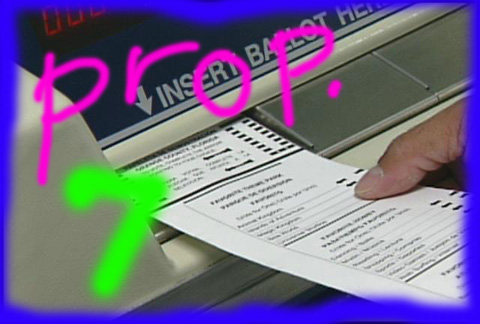
We all understand that moving ahead quickly on issues of renewable energy issue is essential. But is the well-intentioned but dreadfully written Prop. 7 the way to go?
Soojin Yoon and Rachel Geragos chose to examine this issue and each concluded that Prop 7 should be a big NO Vote:
Rachel Geragos observed that, “Those who are for Proposition 7….want to see California become a world leader in clean power technology and to help ceate a solution for wiring energy costs…”
But, she wrote, the pricey proposition was created and paid for almost entirely by out-of-state “billionaire Peter Sperling from Arizona,” while opposed by a long list of California organizations—from renewable energy providers to taxpayer groups and all major environmental organizations.
And here’s Soojin Yoon wrote about Prop. 7:
To what lengths are Californians willing to go to increase the quantity of renewable energy sources in the state?
Come November 4th, there will be a definitive answer as voters cast their choice for or against Proposition 7.
The proposed measure would require Californian utility companies to generate a certain portion of their power from renewable energy sources, with a goal of 50% renewable energy generated by the year 2025. Those companies failing to comply with benchmarks set in place would be subject to penalties. Additionally, some jurisdiction over such utilities would be transferred from the Public Utilities Commission to the Energy Comission.
Proponents for this ballot measure see this as a great opportunity to assert California as a leader in clean power technology. Additionally, there would be many new jobs created by Proposition 7, which would be a nice boost to the sagging economy. Further, the proposal allows for the state to help set the pace for the goal of 50% renewable energy by the year 2025 set by the federal government. To boot, proponents claim that the plan meets environmental protection standards.
Meanwhile, detractors have come out from across the state to voice their strong displeasure for the initiative.
The main point of contention is regarding the actual language of the plan, which the opposition cites as a poorly written document filled with flaws that would be near impossible to fix in the event that it was passed, barring another vote by the people or the ever-elusive 2/3 vote of the legislature. Further, they argue it would cost Californians much more for electricity- an estimated 10% more than market value. Above all, opponents believe smaller energy plants would be bullied out of the equation based on the output requirements of the bill.
Will Californians bite the proverbial bullet and pay for more expensive energy in hopes of improving the energy crisis, or will they wait until they see a more appealing package to combat this growing problem?
Either way, the vibe around local polling stations is sure to be electric.
SOOJIN’S PERSONAL STATEMENT:
I think that it’s better to wait and come up with a sound plan than to try to hastily put together a solution that is going to need trouble shooting as soon as it is implemented. Why try to fix a leak with scotch tape when you can wait for something more secure? Proposition 7 will not solve the energy crisis overnight. I think it would only be counterproductive to vote yes.
Yep. Precisely.
